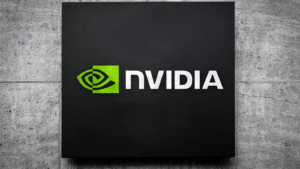Emotion artificial intelligence is already being used extensively in several sectors. By analyzing consumer responses, advertising firms such as Affectiva forecast client behavior and maximize marketing strategies. Cogito employs audio analytics in contact centers to let agents modify replies based on client emotions. Tracking mood swings and offering mental health coping strategies using speech patterns, the CompanionMx app uses
Driving more safely is also possible thanks to emotional AI use cases in the automotive sector, and Toyota (NYSE:TM) is working on this concept for use in its line. Mercedes-Benz (OTCMKTS:MBGAF) has also introduced generative AI-powered emotive profiles at CES 2024 to increase the MBUX Virtual.
Let’s investigate three well-known tech stocks that are also playing in emotion AI among these advances. These three were successful year after year over the previous ten years and are suited as “Strong Buy” equities with double-digit upsides.
Nvidia (NVDA)

Nvidia (NASDAQ:NVDA) is backing Synthesia, a company that has developed “Expressive Avatars,” artificial intelligence-generated digital avatars capable of text-based communication of human emotions.
This technology simplifies video creation by replicating human emotions without cameras, microphones, or performers. For more than 55,000 companies, including several Fortune 100s, Synthesia’s AI video generator drives training films and business presentations.
Moreover, the NeMo SteerLM model is supported by Nvidia’s Avatar Creation Engine, which provides NPC emotions and personalities. This integration allows creators to offer NPC emotional traits so they may create more realistic and engaging games and raise player involvement.
Along with a modern language model called Mistral NeMo 12B under Mistral AI, Nvidia also unveiled Architecture with business orientation help with coding, summaries, international translations and chatbots.
Aside from its efforts in emotion AI, Nvidia is a gem among tech stocks right now, especially after a historic 10-for-1 stock split. The board felt a stock split was needed after an AI-induced rally pushed Nvidia’s market cap to $2.7 trillion. After the stock split, NVDA shares are trading at a more reasonable valuation, so analysts are projecting a 16% upside from the current price of $122.59.
Microsoft (MSFT)

Microsoft (NASDAQ:MSFT) and NVIDIA combine to advance corporate generative artificial intelligence. Azure NC H100 virtual machines use NVIDIA’s H100 NVL platform for mid-range artificial intelligence training and inference. This collaboration improves clinical research and clinical practice in the life sciences and healthcare by using cloud, artificial intelligence and supercomputing technologies.
The big language models used in NVIDIA’s Triton Inference Server will enhance Microsoft’s AI-powered Copilot for Microsoft 365, increasing efficiency and creativity. This link will provide contextualized, real-time information to increase user output.
Such initiatives, together with Microsoft’s AI-powered tools and the monetization potential of Azure cloud services, led Wedbush analysts, among others, to lift their price targets on MSFT.
Microsoft had a strong third quarter of fiscal year 2024. At $61.9 billion, the company recorded a 17% income growth and a 20% profit increase of $22 billion.
Demand for AI technologies drove this performance over Wall Street expectations. Azure cloud platform revenue rose 31% during the fiscal third quarter due to AI services. Amazon (NASDAQ:AMZN) still dominates the market, but Microsoft is closing in, with a record 25% market share in Q1 2024.
As a result, Microsoft had $80.01 billion in cash as of March; its enormous reserve allows it to invest in emotion AI without hurting other business concerns. MSFT upside is 13.5% based on a target price of $504.75 versus the last close of $444.85.
Alphabet (GOOG,GOOGL)

Alphabet (NASDAQ:GOOG,NASDAQ:GOOGL) improved the search generative experience using conversational search driven by artificial intelligence. The new features are artificial intelligence picture generation for query-based image downloads and alternate drafts for writing aids. These tweaks try to enhance Google’s traffic and search experience.
Alphabet put an artificial intelligence model called Gemini 2 into Gmail and Google Docs. This approach increases emotional intelligence and contextually appropriate and sympathetic reactions, improving user connection and satisfaction.
Alphabet’s DeepMind, which attempts to streamline healthcare operations and improve patient treatment, has launched AlphaCare, a new artificial intelligence system meant to empower healthcare professionals by providing emotionally intelligent patient involvement and support.
Apart from its efforts in the emotion AI space, Alphabet is one of the strongest tech stocks out there. This is further solidified by its results for the second quarter of 2024, which yet again exceeded analysts’ estimates. Sundar Pichai, Google’s CEO, cited its Google Cloud Platform and AI-powered services as prominent growth drivers. Despite this earnings beat, Alphabet shares hold a potential upside of 12.5%.
On the date of publication, Faizan Farooque did not have (either directly or indirectly) any positions in the securities mentioned in this article. The opinions expressed in this article are those of the writer, subject to the InvestorPlace.com Publishing Guidelines.
On the date of publication, the responsible editor did not have (either directly or indirectly) any positions in the securities mentioned in this article.
Faizan Farooque is a contributing author for InvestorPlace.com and numerous other financial sites. Faizan has several years of experience in analyzing the stock market and was a former data journalist at S&P Global Market Intelligence. His passion is to help the average investor make more informed decisions regarding their portfolio.
